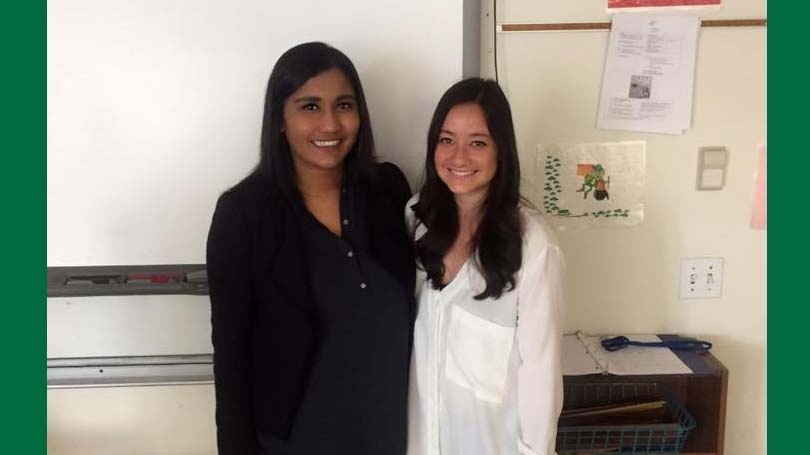
Students from The Dartmouth Institute for Health Policy and Clinical Practice, Sayoni Saha (L) and Sarah Bressen (R) have developed a comprehenisive healthcare and STEM-related careers program.
America’s challenge with graduating students with Science Technology Math and Engineering (STEM) degrees is well documented. Researchers are now focusing less on the low number of STEM graduates and exploring possible reasons for this shortage, some of these reasons point to experiences in high school. Intent to pursue a STEM major and career has been linked to early schooling and as one Business Insider article points out- we’re doing a bad job of convincing young students that science is cool.
Sayoni Saha and Sarah Bessen are pursuing their masters degrees in public health at The Dartmouth Institute, and spent this year considering some of the difficulties associated with motivating young students to pursue STEM and healthcare. They became particularly concerned with how these challenges are intensified for students from under resourced backgrounds or students with limited familial support. As a result, Saha and Bessen designed and launched a program to address some of these challenges.
Tell us about the program you developed.
Pathways exposes high school students in the Upper Valley to a diverse range of healthcare and STEM-related careers through panels, hands-on activities, and mentorship opportunities. The program is designed to be relatable and accessible- helping students with anything from pursuing internship opportunities to providing more information about a given career pathway.
What was the background for this project?
As MPH students at The Dartmouth Institute, a classmate and I spent this year considering some of the difficulties associated with motivating young students to pursue STEM and healthcare. Sarah Bessen (Dartmouth ’16) and I were particularly concerned by how these challenges are intensified for students from under resourced backgrounds or students with limited familial support. As a result, we designed and launched a program, Pathways, to address some of these challenges. Pathways exposes high school students in the Upper Valley to a diverse range of healthcare and STEM related careers through panels, hands-on activities, and mentorship opportunities. The program is designed to be relatable and accessible, helping students with anything from pursuing internship opportunities to providing more information about a given career pathway.
What inspired you to develop the Pathways model?
We were largely inspired by the diversity of our own graduate program at The Dartmouth Institute, which brings together clinicians, recent undergraduates, and researchers to study public health. The rich backgrounds of our peers pushed us to think about careers we had not previously considered and design a program that delves into professions beyond traditional ones like physician or nurse. Accordingly, Pathways tries to give students healthcare and STEM insight from a variety of angles. The program incorporates speakers from graduate students across Tuck School of Business, Thayer School of Engineering, Geisel School of Medicine, and The Dartmouth Institute to deliver a more multidisciplinary perspective. We hope this approach is more reflective of the collaborative and team based culture that marks healthcare and STEM today. They also believe this approach tackles the stereotype of a single inflexible journey towards a career in STEM.
Where is the program available?
Pathways has currently been launched across three schools in the Upper Valley. The program is tailored to fit the unique interests of each school, science department curriculum, and student population. While Pathways looks a little different at each school, it uses weekly panels and hands-on activities on a given topic in healthcare or STEM. High school students have the chance to engage in the activity and interact with panelists who share more about their own paths and career trajectories.
Recently, we led an introductory Pathways session for students in an AP calculus and health class. Following a brief case study activity, students had the chance to interact with a panel of Dartmouth graduate students. The panel was comprised of a clinician, pre-medical student, health policy researcher, and engineering PhD student. Panelists discussed past experiences in fields ranging from biomedical imaging to podiatry to rural healthcare policy work.
What are the plans for the future?
Moving forward, Pathways will continue to feature panelists from different disciplines and career stages. We are focusing on facilitating mentorship opportunities for interested students. Panelists and Dartmouth graduate students are connected with students to provide greater insight or advice regarding their work. In addition to providing more information about the field, mentors are available to help students build important skills such as contacting professors regarding research opportunities or writing a cover letter. We are also striving to develop a sustainable plan for Pathways so that future Dartmouth public health students can deliver the program every year. Pathways provides high school students in the Upper Valley an opportunity to consider rigorous and rewarding careers in STEM and healthcare.